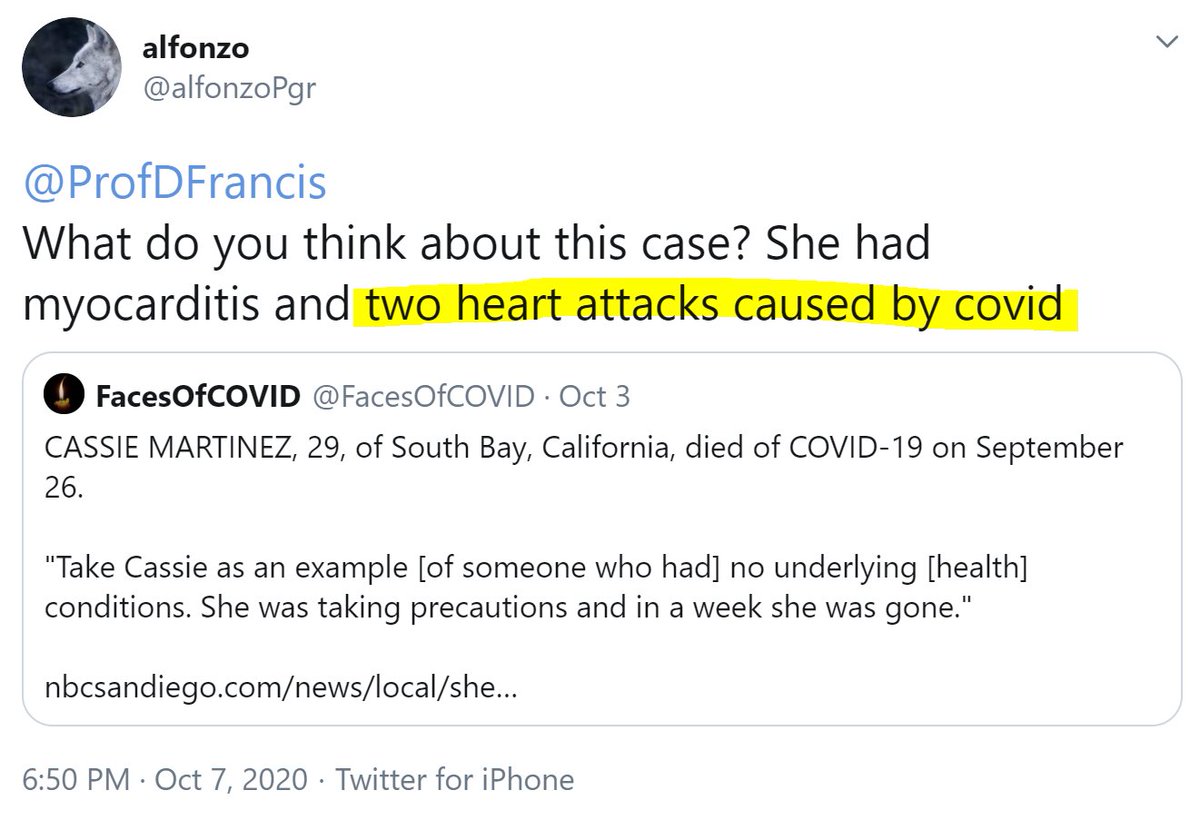
Prof Darrel Francis ☺ Mk CardioFellows Great Again
10 Oct,
19 tweets, 4 min read
Some people seem to think I am the world expert on everything. I used to tell my daughter that, when she was 3, and she believed me.
As it is quite flattering to see that grown adults similarly gullible, I shall attempt to answer.
As it is quite flattering to see that grown adults similarly gullible, I shall attempt to answer.
https://twitter.com/WhatsupFranks/status/1314675894838079493?s=20
I don't know what "incorrect use" means.
It is obviously unwise to use the masks as a meal.
Or a parachute.
Or to stuff one in each nostril and then close one's mouth.
It is obviously unwise to use the masks as a meal.
Or a parachute.
Or to stuff one in each nostril and then close one's mouth.
I do agree with the second concern, being the false sense of security that could lead to slippage of social distancing, handwashing etc.
That is a useful point and I would add this:
That is a useful point and I would add this:
Social distancing, handwashing, not touching your face, protects whom?
Wearing a face covering protects whom?
So people should not really gain ANY sense of security from wearing a facemask.
I _think_ the correct answers are:
Distancing/Hygiene protects both participants in a social interaction.
Face covering protects NOT the wearer but the OTHER person (and only a little)
I _think_ the correct answers are:
Distancing/Hygiene protects both participants in a social interaction.
Face covering protects NOT the wearer but the OTHER person (and only a little)
My reasoning for thinking that the wearer is little protected is as follows.
Virus particles in water droplets, of saliva or nose mucus etc, mainly come out of the body here.
Therefore the droplets mostly have to get throught the mask to get to anyone else.
Virus particles in water droplets, of saliva or nose mucus etc, mainly come out of the body here.
Therefore the droplets mostly have to get throught the mask to get to anyone else.

In contrast, _inbound_ water droplets can only be affected by the mask if they hit the mask itself. There are plenty of other places for them to land, and then be transferred to the nose and mouth by unnoticed hand-touches. 

And the above reasoning is just based on walking around and chatting to people.
If you sit down and work at a desk, it is much more obviously asymmetrical.
Here, HER facemask will reduce the virus particles she sheds onto the table (for others to pick up and rub in their faces)
If you sit down and work at a desk, it is much more obviously asymmetrical.
Here, HER facemask will reduce the virus particles she sheds onto the table (for others to pick up and rub in their faces)

But her facemask confers little protection from her picking up coronavirus from the table etc, and rubbing into her eyes and (if she later removes her mask, away from the meeting) her mouth and nose. 

So the key here is to reiterate to people that facemasks are NOT to provide you protection from death,
but reduce the extent to which you _unknowingly_ pepper people and things with the virus that is asymptomatic to you, but will go on (via your friends) to kill some people.
but reduce the extent to which you _unknowingly_ pepper people and things with the virus that is asymptomatic to you, but will go on (via your friends) to kill some people.
It is true that some people are stupid, and fail to understand this.
That is the difficulty of working in public health. You have to worry about what the stupidest person on earth would make of your remarks, when you are not there to explain it 1-to-1.
Rather him than me!
That is the difficulty of working in public health. You have to worry about what the stupidest person on earth would make of your remarks, when you are not there to explain it 1-to-1.
Rather him than me!
And his third and final point is that if the masks capture your droplets containing the virus, they become a reservoir of your infection.
I am not desperately troubled by this. Yes, those are particles you would otherwise have got out of your body, and now they are trapped near your body.
But this is only a concern if you _already_ have the virus, and it is _asymptomatic_. In which case, who cares?
But this is only a concern if you _already_ have the virus, and it is _asymptomatic_. In which case, who cares?
Obviously, don't touch OTHER people's facemasks.
(Doh!)
(Doh!)
So of the Norwegian colleague's 3 concerns, all are technically correct BUT only the middle one is worth addressing, through education.
We need to keep reminding dim people that masks catch OUTBOUND water droplets a bit, but do very little for INBOUND virus particles.
We need to keep reminding dim people that masks catch OUTBOUND water droplets a bit, but do very little for INBOUND virus particles.

If this person was a medical student I would give them a dunce cap to wear.
https://twitter.com/PlainVa86760081/status/1314826358439186433?s=20
Asymptomatic does not mean healthy!
It means having no symptoms.
Healthy has multiple meanings, including:
(a) No previous diagnosis of diseases
(b) No previous diagnosis of diseases nor even previous symptoms of anything
(c) No coronavirus
(d) No coronavirus symptoms
It means having no symptoms.
Healthy has multiple meanings, including:
(a) No previous diagnosis of diseases
(b) No previous diagnosis of diseases nor even previous symptoms of anything
(c) No coronavirus
(d) No coronavirus symptoms
• • •
Missing some Tweet in this thread? You can try to
force a refresh









